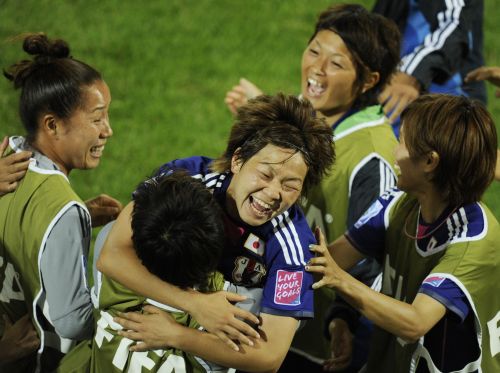FRANKFURT, Germany (AP) ― Japan carries memories of the devastation the tsunami heaped on its country into every game at this Women’s World Cup.
In sharp contrast, Sweden’s march through the tournament has been as carefree as the twirling, joyous team dance that accompanies every victory.
But in the semifinal Wednesday at Frankfurt’s Commerzbank Arena, the difference visible on the field will be tactical: the “Japanese game” of close passing and intricate dribbling versus the sweeping moves and physical play of the roaming Swedes.
In sharp contrast, Sweden’s march through the tournament has been as carefree as the twirling, joyous team dance that accompanies every victory.
But in the semifinal Wednesday at Frankfurt’s Commerzbank Arena, the difference visible on the field will be tactical: the “Japanese game” of close passing and intricate dribbling versus the sweeping moves and physical play of the roaming Swedes.

Japan became the surprising team of the tournament by eliminating Germany 1-0 in extra time Saturday, with Sweden following it up with a routine 3-1 elimination of Australia a day later.
With Japan ranked fourth in the FIFA standings and Sweden just one place below it, the semifinal should make for an open and unpredictable match.
If the happy victory dance, a blur of yellow and blue, has come to symbolize Sweden, Japan is known for the solemn postgame procession of its players behind a banner that reads “To our friends around the world ― Thank you for your support.”
It refers to the global outpouring of aid in the wake of the March 11 earthquake and tsunami that left nearly 23,000 dead or missing and touched off a nuclear crisis at the Fukushima nuclear plant.
The memory of the disaster has been a constant theme running through the team at the three-week tournament.
“We want to show the people in the world that we are grateful,” Japan coach Norio Sasaki said.
Yet, it goes well beyond that.
“Our playing is to be an encouragement for the victims of the disaster in Japan,” Sasaki said. “We think of the problems people in the disaster regions have.”
In Japan, the team’s rise at the championships and its stunning upset of the host nation and defending champion Germany has brought relief from the daily pain of the disaster.
The country has been battered by dozens of strong aftershocks since the strongest quake in Japanese history.
Their success on the global stage has turned into a bigger hit than baseball or sumo wrestling and the media dominance of a woman’s sport is a huge surprise in itself.
The players also get something in return, Sasaki said. Seeing how the Japanese people prevail despite such adversity is a mental boost.
“The images of these people gave us strength,” Sasaki said after the win over Germany, when the Japanese absorbed one German attack after another, only to hit back with a perfect counter in extra time against a tiring opponent.
The team is called “Nadeshiko” in reference to an indigenous flower and the beauty of Japanese women’s spirit.
On the pitch, Nadeshiko translates into crisp, precision passing and lightning quick moves that have dumbfounded bigger and physically stronger opponents like the Germans.
In that sense, the Swedes have been forewarned.
They already had a taste of what’s to come when they had to fight hard to earn a 1-1 draw against Japan in a pre-World Cup exhibition.
“We don’t have very good memories of playing against them,” Sweden coach Thomas Dennerby said. “Our players will work hard to go one step further.”
They have done so every time. All of their first-round games were decided by one goal. But that did include a 2-1 win over the United States, which is now the tournament favorite.
The tight games have melded the team together.
“There is a fantastic atmosphere in our team and we pulled each other through,” forward Lotta Schelin said.









![[Today’s K-pop] BTS pop-up event to come to Seoul](http://res.heraldm.com/phpwas/restmb_idxmake.php?idx=644&simg=/content/image/2024/04/17/20240417050734_0.jpg&u=)
![[Graphic News] More Koreans say they plan long-distance trips this year](http://res.heraldm.com/phpwas/restmb_idxmake.php?idx=644&simg=/content/image/2024/04/17/20240417050828_0.gif&u=)





![[KH Explains] Hyundai's full hybrid edge to pay off amid slow transition to pure EVs](http://res.heraldm.com/phpwas/restmb_idxmake.php?idx=652&simg=/content/image/2024/04/18/20240418050645_0.jpg&u=20240419100350)

